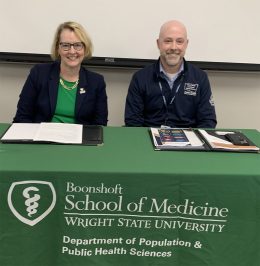 Wright State University’s Boonshoft School of Medicine and its Master of Public Health program are undertaking several initiatives to bolster the public health workforce, which is facing a critical shortage, by training future community leaders.
Wright State University’s Boonshoft School of Medicine and its Master of Public Health program are undertaking several initiatives to bolster the public health workforce, which is facing a critical shortage, by training future community leaders.
The Department of Population and Public Health Sciences in the Boonshoft School of Medicine is collaborating with the Public Health — Dayton & Montgomery County and the Clark County Combined Health District to formalize enhanced affiliation agreements with the Boonshoft School of Medicine, designating each as an academic health department.
The academic partnership agreements build upon the School of Medicine’s existing partnerships with nine other health departments in southwest Ohio and will help prepare the next generation of public health leaders and skilled practitioners.
“Our three organizations, including the other health districts in southwest Ohio, are committed to rebuilding the local public health workforce by building awareness about the various meaningful professions within public health. Together, we inspire and train a generation of leaders ready to tackle public health challenges,” said Marietta Orlowski, Ph.D., chair and professor of population and public health sciences in the Boonshoft School of Medicine.
Workforce development is the central goal of the academic health department, said Becky Thomas, M.D., medical director of Public Health — Dayton & Montgomery County.
“The two main outcomes of an academic health department are a well-trained public health workforce and evidence-based public health practice, and the impact to our community is improved community health,” she said.
An academic health department is an arrangement between an academic institution and a public health agency that provides mutual benefits in teachings, research and service, with academia informing the practice of public health and the public health department informing academic programming.
“The collaboration with Wright State has evolved into a strategic partnership with transformative potential to improve the health for our communities,” said Thomas, who received a Master of Public Health from Wright State.
Public Health and the Boonshoft School of Medicine have a long history of collaboration.
For instance, the public health agency played an instrumental role in the creation of the Boonshoft School of Medicine’s Master of Public Health program 20 years ago.
Many of the agency’s current and future leaders are graduates of Wright State’s Master of Public Health program, and they continue to give back to the School of Medicine by offering guest lectures, mentoring students or serving on advisory committees, while public health faculty members serve on several Public Health committees.
The academic health department agreement will benefit Wright State public health, medical and nursing students.

Becky Thomas, left, and Chris Cook are two of the many graduates of Wright State’s Master of Public Health program who now play leadership roles in local health districts.
For instance, Wright State public health students will have opportunities to learn from doctors, public health officials, nurses and social workers and participate in internships, practicums or research projects addressing community health issues. Medical students can participate in clinical rotations with public health nurses or lab technicians.
“Not only does this relationship help with our public health workforce needs, it helps with our educational programs too, providing internships and practice-informed curriculum for our students,” said Sara Paton, Ph.D., program director of Wright State’s Master of Public Health program.
In addition, students benefit from having public health professionals discuss current events and best practices in their classes.
“This agreement enhances this affiliation, expanding the types of activities and expediting the process for student and research experiences. This allows us all to serve our students, our organizations, and the larger community better,” said Orlowski, who is president-elect of the Public Health board.
Wright State’s Department of Population and Public Health Sciences is taking other steps to address the shortage of public health workers, including offering specialized classes for the current workforce, such as a class for local epidemiologists.
The department’s new Bachelor of Arts in Public Health and Bachelor of Science in Public Health will also help recruit and train students for public health careers. The B.A. degree trains students in health education, promotion and advocacy, while the B.S. degree trains students in environmental health, emergency preparedness, epidemiology and medicine.
The department also offers scholarships for public health employees.
“These are in-demand, high-paying jobs — with meaning,” Orlowski said. “We are committed to preparing the next generation of public health leaders.”
Master of Public Health 20th anniversary celebration
 Wright State’s Master of Public Health program will celebrate its 20th anniversary with a series of events with local public health, health care and nonprofit partnership organizations.
Wright State’s Master of Public Health program will celebrate its 20th anniversary with a series of events with local public health, health care and nonprofit partnership organizations.
The department will host a kick-off event and reception on Thursday, Sept. 26, at 3 p.m. in the Apollo Room in the Student Union. Register to attend.
“To honor our 20th anniversary, we welcome alumni, students, faculty, community partners and the wider Raider community to celebrate where we are, where we have been and where we are headed,” Orlowski said.

 Milling around
Milling around  Wright State recognizes Nursing Professor Kim Ringo for advancing international student success
Wright State recognizes Nursing Professor Kim Ringo for advancing international student success  Wright State honors graduating students for distinguished doctoral dissertations
Wright State honors graduating students for distinguished doctoral dissertations  Top 10 Newsroom videos of 2025
Top 10 Newsroom videos of 2025  Museum-quality replica of historic Hawthorn Hill donated to Wright State
Museum-quality replica of historic Hawthorn Hill donated to Wright State 